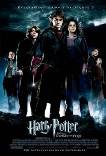 There were some interesting comments and very good questions raised regarding my last week’s blog on Harry Potter. I wish I had time to address these, and hope to do so later.
There were some interesting comments and very good questions raised regarding my last week’s blog on Harry Potter. I wish I had time to address these, and hope to do so later.
For instance, someone in Kenya asked, “So where is the evidence of actual spells being cast, and working? Where are the people flying around on brooms or whatever?”
It’s true that in the last week I haven’t observed a single person flying on a broom, but there’s actually more that can be said in response to that question. My guest blogger, Ann Tatlock, will answer that question in a post that’ll be up next Monday.
Also, someone asked about the Voice of the Martyrs display I saw in Atlanta three weeks ago. We’re going to feature VOM in an upcoming e-newsletter, so we’ll include the photos then, and be sure to link to it from this blog.
Meanwhile, because my wife and I will be gone, I’ve prepared three blogs, this one with Sarah Anne’s insights, one for next Monday with Ann Tatlock’s observations, and another for later next week. (That one will be on gratitude and complaining; I think you may enjoy it.) Part of our time away (we have two young men staying in the house while we’re gone, in case you’re security conscious) will be spent going over the screenplay for my novel Deadline, which, if all goes as planned, will be made into a movie.
I’ve not yet had a book made into a movie, though I’ve had many years of discussing various projects with interested parties. I’ve learned this about moviemaking: everything takes longer than expected and there are countless obstacles along the way. That’s okay, because I could die content without any of my books being made into movies. But my biggest concern has always been that if a movie is made it will glorify God, and not in any way displease Him. The people I’m working with on Deadline love Jesus and have integrity (two commodities less common than you’d hope), but prayers for all of us would be much appreciated.
Our friend Julie sent a great email two weeks ago:
I was having the boys write out Ephesians 6:1 from their Bibles because they can't seem to understand about obedience....
Here is Elias' version: he wrote: "children sometimes obey your parents in the Lord for this is right."
It took everything in me to stay serious. But I oh so gently had him read the passage again, and he wrote it correctly more than once, enough to have it memorized :-)
This is more than a funny story. I wonder how often without admitting it I have supplied the word “sometimes” when reading Scripture. Sometimes meditate on God’s Word (not day and night). Sometimes pray (not without ceasing). Sometimes speak the truth in love. Sometimes flee from immorality. Sometimes seek first God’s kingdom. Sometimes love God with all my heart. Sometimes love my neighbor as myself.
Closer to our subject matter, when we read Deuteronomy 18, are we like my friend Julie’s son who inserted “sometimes” into the command? As in, sometimes stay away from the occult and witchcraft and sorcery? But sometimes, if it’s endearing or entertaining or popular or well written or has some good morals or doesn’t tempt YOU to become a witch, then you don’t need to stay away from it, because it’s harmless?
Two new friends of mine, fellow writers and wonderful sisters in Christ, are Sarah Anne Sumpolec and Ann Tatlock. I’ve asked their permission to publicly post what originally were private notes to a group we’re part of. I’ll include Sarah’s insights in this post, and then Ann’s will follow later, on next Monday.
Sarah Anne was on the Tyra Banks show, dealing with “The Mysterious Lives of Witches.” She shared her story of her background in the occult before she came to Christ. She had a “spirit guide” that encouraged her toward suicide, but thankfully God took hold of her, big time. Her website is www.sarahannesumpolec.com. Sarah told me the Tyra Banks broadcast was recently rerun and she’s getting considerable hate mail from witches and pagans. I know she’d appreciate your prayers. To say the least, she speaks from a position of credibility.
From Sarah Anne Sumpolec

I think Harry Potter is probably good clean fantasy fun for 99 percent of its readers. I'd be surprised if more than 1 percent went looking for the magical reality behind the fantasy. But then again, what is 1 percent of 500 million readers? How much of an impact is that?
If we believe that embedding Christian truth in fiction influences readers for Christ, we would be irrationally inconsistent to believe that fiction in which heroes command forces and cast spells would not make witchcraft, occultism, and Crowleyan magick very attractive to some readers. You can't have it both ways.
...I've never been on the side that wants the books banned or burned and I don't stomp around decrying the evils of Harry Potter. I really don't. What I always advise is to "approach with great caution".
You see, there really is no comparing of the fantasy worlds of Tolkien or Lewis with Rowling since there are no kids on Earth who are in possession of a magical wardrobe to transport them to Narnia and they will never find their way to Middle Earth. But Rowling's World has a real-world counterpart. A real world counterpart that is very, very dangerous. No, kids can't fly in a car to Hogwart's, but they can type in magick into Google and instantly find hundreds of sites offering up a boatload of information about all things witchcraft. The real world of witchcraft, not the imagined one of Rowling. Harry Potter is adored by his fans — how can we think that kids won't find ways to be "more like him" in whatever way we can. And many pagan communities were pleased with Harry Potter precisely because it did raise interest about the real world of witchcraft.
For your typical kid in a stable home that is loved and cared for, reading Harry Potter probably won't make them seek out witchcraft. Because that is not the type of kid witchcraft draws. It draws kids who feel out of place, alienated or unloved. It draws kids who want to find a place where they "belong." And pagan communities offer "belonging" and "identity" in spades. And they usually do it better than the church because there, there aren't any rules to follow, they just accept you as you are. A very powerful concept for young people. 70% of practicing witches get their start in their teen years.
The other issue I have is that while a majority of people claim to believe in both God and Jesus, a small minority actually know what that means. Much of your nominal Christianity which is practiced in the US is tainted with new age and pagan beliefs that most people aren't aware of. Witches teach that you can be a Christian and a witch. That the two things are not mutually exclusive. They believe in the "law of the three-fold return" — which is eerily similar to "you reap what you sow". The Wiccan rede is "If ye harm none, do what ye will" which sounds somewhat like "do unto others as you would have them do unto you.”
Satan never wanted to BE God, he wanted to BE LIKE God and since the beginning of the time he has offered us twisted truth, a counterfeit that looks similar but is not real. He is more effective in deceiving people when he offers up the twisted version of truth because we swallow it a whole lot easier. It's our own fault — because most people don't know their Bibles well enough to recognize the truth from a lie.We have a cunning enemy, and I think we often underestimate what he can do with a flock of sheep that do not know their Shepherd's real, true voice. This latest turn of events have not made me happy because the world of Harry Potter is not Christian simply because it has biblical themes. People have been stealing and using those concepts for their own purposes for many, many years. The concept of good and evil itself is a highly Biblical concept but just because there is good and evil in a story doesn't make it Christian.
Same goes with forgiveness or sacrifice or any myriad of concepts. Pagans often "believe" in those ideas too. The defining difference in Christianity is Jesus and the cross of Christ. Even if Rowling used ideas like crosses or blood sacrifice, it is not enough, in my opinion, to overcome the very real dangers that kids get exposed to by reading (and falling in love) with Harry Potter.
Fiction is a very powerful medium, as we all know. It's the reason we writers write. Can we show witchcraft in our books in a positive way? The answer for me is no. I was part of that world. I saw horrible, terrible things that I will never be able to completely erase from my mind. I don't often talk about those things because I hate thinking about them. I nearly lost my life in that world. It is a real world, with real dangers, because we have a very real enemy.
And in the case of Harry Potter, I believe it will do far more harm than good.
Anyhow, that's my two cents.


